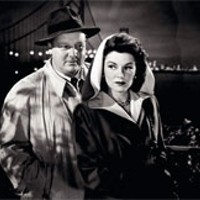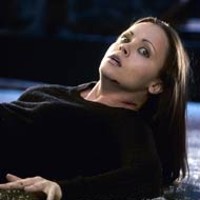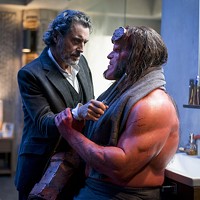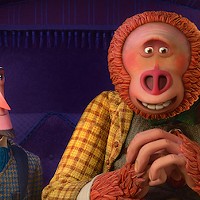

SHORT CUTS (1993). The opening shot in Robert Altman's masterful feature is that of helicopters spraying the Los Angeles landscape in an effort to control the Medfly problem. It's an apt metaphor, as this 188-minute gem shows how a veil of poison has likewise blanketed its various characters' lives. Working from Raymond Carver's short stories, Altman follows 22 middle-class people as they struggle with harsh realities plucked from the real world: An arrogant cop (Tim Robbins) hits on numerous women, though he doesn't fool his spouse (Madeleine Stowe) for one second; a haughty doctor (Matthew Modine) still suspects his artist wife (Julianne Moore) of having had an affair three years earlier; a happily married couple (Andie MacDowell and Bruce Davison) are devastated after a car accident puts their son in a coma; and so on. What an amazing feat Altman (earning back-to-back Oscar nods for The Player and this) has pulled off, as, in true Nashville fashion, he juggles a profusion of storylines which combined reveal a certain spiritual malnourishment at this nation's heart. Rarely has a slice-of-life film been so delicious to consume. Again going the extra mile, Criterion has issued a two-disc DVD set that includes a paperback containing the nine Carver short stories and one poem adapted for the movie; extras on the discs themselves include deleted scenes, documentaries on the making of Short Cuts and on Carver's life, and a conversation between Altman and Robbins.
Movie: ****
Extras: **1/2
SHREK 2 (2004) While most sequels slide down that slippery slope of diminishing quality, this smash hit (behind only Titanic and Star Wars on the all-time top moneymakers list) is easily on a par with its predecessor. In this outing, newlywed ogres Shrek (voiced by Mike Myers) and Fiona (Cameron Diaz), with the self-professed "annoying talking animal sidekick" Donkey (Eddie Murphy) in tow, travel to the Kingdom of Far, Far Away to receive the blessing of Fiona's human parents, King Harold (John Cleese) and Queen Lillian (Julie Andrews). The meeting goes badly, and the fallout leaves everyone vulnerable to the machinations of the Karl Rove-like Fairy Godmother (Jennifer Saunders). Little kids will enjoy the colorful characters, while older audiences will dig the inspired sight gags and sly references to other films. But the movie's real ace is Puss In Boots (Antonio Banderas), a debonair swashbuckler -- or at least when he's not busy coughing up hairballs. In a movie filled with imaginative bits, he emerges as the cat's meow. Extras include American Idol takeoffs created specifically for the DVD, a different ending, and countless games.
Movie: ***
Extras: **1/2
W.C. FIELDS COMEDY COLLECTION (1933-1940). The shorthand description of W.C. Fields' comic persona posits him as a curmudgeonly drunk who dislikes children, but that seriously undermines his awesome contributions to the art of screen comedy. His physical prowess, impeccable timing and way with dialogue (what other actor ever managed to work the words "adscititious excrescence" into a sentence?) marked him as a giant in his day, even as he was constantly frustrated by the fact that he never achieved the stature of Charlie Chaplin. This handsome box set from Universal offers a welcome introduction to the gentlemen with the generous proboscis, even if there are enough notable MIAs to warrant a second volume. International House (1933) isn't a Fields vehicle as much as it's an ensemble piece (he even receives second billing, under the long forgotten Peggy Hopkins Joyce), centering around various characters as they gather at a hotel to witness the demonstration of an early television set. The eclectic cast includes Bela Lugosi, Rudy Vallee, and the comedy team of George Burns and Gracie Allen, though the best moments come from Fields and Cab Calloway, the latter pulling out all the stops while performing "Reefer Man." It's a Gift (1934) is essential Fields, with the actor cast as a hapless grocery store owner who dreams of purchasing an orange grove in California. The sequence featuring the destructive blind man is the film's most famous, though the lengthy set piece in which Fields tries to get some sleep is its funniest. You Can't Cheat an Honest Man (1939) gives too much screen time to ventriloquist Edgar Bergen and his dummy Charlie McCarthy (their routines haven't aged well), but the film crackles when Fields takes center stage, playing unscrupulous circus manager Larson E. Whipsnade. The most conventional film in the set, the Western spoof My Little Chickadee (1940) nonetheless benefits from the superstar teaming of Fields and Mae West, who also wrote the screenplay together. She's (what else?) a woman of loose morals who ends up romancing a masked bandit sought by the law; he's (what else?) a shyster who gets no respect yet still manages to wiggle out of several sticky situations. There's too much plot and not enough irreverence, but even these constrictions don't hamper Fields' all-pro efforts. Finally, The Bank Dick (1940) stands as Fields' best effort, a series of terrific gags credited to screenwriter "Mahatma Kane Jeeves" (Fields operating under a pseudonym, of course). The comedian stars as Egbert Souse (pronounced "Sou-say," though nobody else bothers to say it that way), a hard-drinking layabout who's mistakenly credited with the apprehension of a bank robber and suddenly finds employment as a security guard. Fields is at the top of his game in this riotous classic, and, yes, that's Shemp Howard (of Three Stooges fame) as the bartender who keeps Souse suitably soused. Extras include the documentary W.C. Fields: Behind the Laughter and theatrical trailers.
International House: ***
It's a Gift: ***1/2
You Can't Cheat an Honest Man: ***
My Little Chickadee: ***1/2
The Bank Dick: ****
Extras: **1/2





